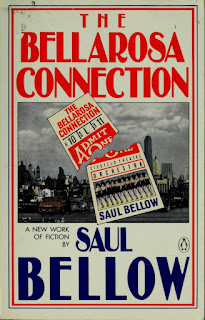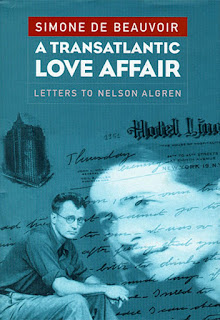Saul Bellow's The Bellarosa Connection
"At times I feel like a socket that remembers its tooth"
I had had a failure of memory the other morning, and it had driven me almost mad, writes the nameless narrator of Saul Bellow's 1989 novella The Bellarosa Connection. I had a tune in my head. The words came to me:
Way down upon the...Way down upon the ......upon the ______ River...But what was the river called! (69-70)
The narrator began the shaggy dog tale describing his retirement from a lucrative 40 year career "[a]s founder of the Mnemosyne Institute in Philadelphia," leaving "the Institute in the capable hands of my son," asserting that he "would like to forget about remembering" as he proceeds to do the ironic, emphatic opposite for the rest of the book.
When I first picked it out from a library shelf (I do own a Kindle) for a now unremembered reason, I was haunted by Bellow's prediction: "In your twilight years...you don't want to keep doing what you did throughout your life: a change, a change - your kingdom for a change!...but if you have worked in memory, which is life itself, there is no retirement except in death" (1-2). So Bellow was channeling not so much Richard III as Lear.
My memory beat the narrator's (Swanee!) before Bellow connected his punch (line), and I enjoyed the Skinner Box moment of stimulus-response as a little brain zotz of endorphin probably spritzed my amygdala. Altogether, The Bellarosa Connection reminds me of George Carlin's best stand up specials. It reads like a Remember Me! from a trinity-ghost of King Hamlet/Carlin/Bellow. The novella, which is ostensibly about memory and mortality, conjures in my mind Pavlov and the stainless steel Skinner boxes in my college psych lab where generations of pigeon memories were created/destroyed. It invokes my current reading of reports on memory research by neuroscientists in Los Angeles, New York, and Toronto. It parallels predictions about the end of the world (as we know it) not by Aluminum Hats but from the best (human) minds working in Artificial Intelligence who argue about the year 2045, when The Singularity may occur and computers with vastly more memory than homo sapiens will supersede our species, and [Star Trek's] Data rules. One need look no further than theorist Ray Kurzweil, who envisions a future in which developments in medical nanotechnology will allow us to download a copy of our individual brains into these superhuman machines, leave our bodies behind, and, in a sense, live forever. It's heady stuff.
Now I do recall what prompted my search to relocate Bellow's Bellarosa after all these years. Last November, Liesl Schillinger wrote a review of Julian Barnes's new novel The Sense of an Ending
. At least two earlier books by Barnes were favorites of mine (The Sense of an Ending
and Arthur & George
), so I finally got around to reading Sense. Barnes's novel is also about memory, but his characters' disconnections
contrasted so vividly with Bellow's cast that I had to go back to see
if I remembered correctly. I was also reminded of another 1989 'memory'
novel, Kazuo Ishiguro's The Remains of the Day
that also holds up a better mirror to Mnemosyne*.
Both Bellow and Ishiguru recreated forgotten times through memorable characters like Billy Rose and the Fonsteins and Lord Darlington's butler Stevens in epic landscapes (Holocaust, WWII and postwar fallouts). Memory in A Sense of an Ending begins with postwar coming of age characters in domestic Britain. Maybe that accounts for the sense of diminution, but I suspect it is Barnes's choice of an enervated main character rather than zeitgeist. The 60's weren't the 40's, but there was plenty goin' on. Tony, the main character in Sense, was young in the 60's, and his present day "
tragedy, 'if this isn't too grand a word,' is that he avoids deep connection... In college he did not consummate his relationship with Veronica, telling himself that abstinence spared him burdensome conversations about "where the relationship was heading.'... But 40 years later, her mother's bequest reawakens Tony's memories of...Veronica...'Part of me hadn't minded not 'going the whole way,' he decides. It had protected him from 'an overwhelming closeness I couldn't handle.'
By the end of Sense, why Veronica's mother - who had a child with another of her daughter's beaux - a suicide - left Tony a hunk of money remains distractingly inexplicable.
In contrast, by the end of The Remains of the Day, the reader understands Butler Stevens and quisling-fool Lord Darlington just as we do Bellow's cast in The Bellarosa Connection. Two 1989 reviews (by Christopher Lehmann-Haupt and William H. Prichard, respectively) expertly summarize and comment on Bellow's novella. Bellarosa is Holocaust-escapee Fonstein's Italian mispronunciation of Billy Rose,
whose underground network in Rome saved his life, and whose desire to
thank Billy Rose drives the plot. Fonstein feels connected to Billy
Rose, but the show biz impresario rejects the idea. (You may have seen
James Caan as Billy Rose in 1975's Funny Lady, playing Barbra
Streisand's-Fanny Brice's third husband.) Fonstein's Jabba-the-Hut-sized
wife Sorella pursues Billy Rose, and in a climactic scene, thematically
set in Jerusalem, she confronts the savior-nemesis to get him to spend
15 minutes with her husband. Her rage results in her throwing blackmail
evidence at Billy Rose, but her throw doesn't connect and the documents
fly out a hotel window. At which point, the reader remembers Psalm 137
(King James Version):
By the rivers of Babylon, there we sat down, yea, we wept, when we
remembered Zion.
We hanged our harps upon the willows in the midst thereof.
For there they that carried us away captive required of us a song; and they that wasted us required of us mirth, saying, Sing us one of the songs of Zion.
How shall we sing the LORD'S song in a strange land
If I forget thee, O Jerusalem, let my right hand forget her cunning.
The strange land in Bellow's story is America. Also strange is how US immigrants rise so fast to celebrity. The memory-expert narrator characterizes Fonstein, Sorella, and Billy Rose as grandiose. Billy Rose "had the high color of people who are observed--the cynosure flush" (42). Fonstein's escape from Nazi-Europe is an action-thriller chase. Sorella is literally huge: "She made you look twice at a doorway. When she came to it, she filled the space like a freighter in a canal lock. (48) And Billy Rose's reality eclipses fiction." On March 9 and March 10, 1943, he did produce the consciousness-raising We Will Never Die for audiences of more than 40,000 in two shows at Madison Square Garden. The event received substantial media coverage, carrying its message to audiences beyond those who actually attended the pageant. The pageant was next staged in Washington, D.C.'s Constitution Hall on April 12, before an audience that included First Lady Eleanor Roosevelt, six justices of the Supreme Court, more than two hundred Members of Congress, and numerous members of the international diplomatic corps.
'I did all I could,' said Billy. 'And for that point of time, that's more than most can say...Guys were sitting on their hands...FDR snowed those famous rabbis when they visited him. He blinded them with his footwork, that genius cripple. Churchill also was in on this with him. The goddam white paper. So? There were refugees by the hundred thousands to ship to Palestine. Or there wouldn't have been a state...today. That's why I gave up the single-party rescue operation and started to raise money to get through the British blockade in those rusty Greek tramp ships.' (54)
The Bellarosa Connection is a see-saw of thoughtfulness about memory in general and American Jewish memory in particular. The narrator's first person agonizes over his ironic career as a memory expert/teacher, arriving at an epiphany that he has nearly failed the test Sorella posed for him on the oft-quoted page 65: "The Jews could survive everything that Europe threw at them. I mean the lucky remnant. But now [1959] comes the next test - America. Can they hold their ground, or will the U.S.A. be too much for them?"
The narrator answers her (and a callow young strawman at the end of the book) in the last paragraph (102), summarizing the effort of his memoir:
Suppose I were to talk to him about the roots of memory in feeling...if I were to tell him what retention of the past really means. Things like: 'If sleep is forgetting, forgetting is also sleep, and sleep is to consciousness what death is to life. So that the Jews ask even God to remember...God doesn't forget, but your prayer requests him particularly to remember your dead. But how was I to make an impression on a kid like that? I chose instead to record everything I could remember of The Bellarosa Connection, and set it all down with a Mnemosyne flourish.
If we forget, Bellow exhorts, our right hand will indeed lose her cunning.
Rereading Bellarosa in 2012, I wondered what the author would write today. In 1989, he described the Fonsteins' math prodigy son as gone awry (101), a Las Vegas gambler whose method...involves memorizing the deck in every deal. (99) But Bellow's fears about secular assimilation appear not only unsupported but also zealously advanced by selective (more swords-than-ploughshares) memories of Zion than he might like. Saul Bellow (who died in 2005) would be curious about current memory research, accessible to non-scientists in two Discover articles: that memories are selectively altered just by remembering them, they do have a cranial location (engrams), and some memories are much better forgotten. Now, some of the best human minds are studying brain chemistry/architecture, and others are developing Artificial Intelligence that, come The Singularity, may subsume or supersede human memory. The Bellarosa Connection, Saul Bellow's endeavor to remember Jerusalem, an immortal longing that rivals Cleopatra's, eventually feels like discovering a splendid fossil who tries arguing against evolution.
Review by LS Bassen
Note:
*A titaness. The daughter of Gaia and Uranus and the Greek personification of memory.


